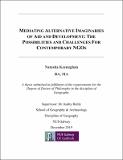| dc.contributor.advisor | Reilly, Kathy | |
| dc.contributor.author | Keenaghan, Natasha | |
| dc.date.accessioned | 2020-04-15T09:13:48Z | |
| dc.date.issued | 2020-03-14 | |
| dc.identifier.uri | http://hdl.handle.net/10379/15873 | |
| dc.description.abstract | This thesis extends considerations around the role that geography can play in disrupting dominant representational tropes through which Global North publics understand distant people and places. Through a focus on NGO communication of aid and development, this research unpacks the possibilities of counter-geographical knowledge to disrupt problematic but deeply entrenched public imaginaries of intervention. As significant actors in the field of aid and development, NGOs constitute powerful and influential communicative structures that represent distant lives to Global North publics. Historically, representations dominating aid and development discourse have scripted distant people and places through reductive and uncritical tropes of poverty, conflict, famine and suffering. The hegemonic imaginings of difference and distance underpinning such tropes have in turn deeply impacted how publics understand the realities of global poverty, while also legitimising specific ideas around response and responsibility. However, in the midst of increasingly diverse and demanding humanitarian landscapes, the dominant imaginaries prioritised by NGOs obstruct the promotion of more critically nuanced public engagement with issues like inequality, injustice and intervention. This thesis examines the potential for counter-geographical representation as a lens through which an alternative, and potentially disruptive, public imaginary can be considered. Moreover, the research examines the possibilities and challenges posed to NGOs in mediating such representations.
The findings of this thesis extend traditional critiques of hegemonic media representation along three main lines of inquiry. Firstly, examining the discourses prioritised by four case study NGOs, the findings identify the organisational principles that provide the greatest potential (and challenge) to NGOs engaging their publics with counter-geographical knowledge. In doing so, this thesis moves beyond dominant critiques of media representation focusing on specific representational and aesthetical tropes. Instead the analysis draws out some of the key organisational principles and characteristics that pose significant obstruction to calls for alternative discourse. Secondly, a focus on the websites of each case study organisation provided a wider communicative platform for examination; the broadest range of each NGO’s public engagement priorities and narrative tropes are articulated and operationalised on their websites. In examining the range of public imaginaries produced through these different public engagement objectives, the instances where counter-geographical knowledge was activated (and/or marginalised) highlights the organisational priorities that best suit the promotion of a more critically aware public audience. Finally, the thesis outlines an adapted framework for critical discourse analysis to examine the role of web design and interactivity in the production and performance of geographical imaginaries. Through methodological and theoretical insights from web design, digital geographies and media studies, this thesis contributes a working methodological framework for managing and examining the discursive capacities of a website’s written text, imagery and clickable buttons. Overall, the thesis examines each NGO’s capacity and willingness to produce counter-geographical knowledge to disrupt dominant mediations of aid and development, thus pointing towards a research trajectory for unpacking and challenging intersections between representation, media and power more broadly | en_IE |
| dc.publisher | NUI Galway | |
| dc.rights | Attribution-NonCommercial-NoDerivs 3.0 Ireland | |
| dc.rights.uri | https://creativecommons.org/licenses/by-nc-nd/3.0/ie/ | |
| dc.subject | Media Geographies | en_IE |
| dc.subject | Aid and Development | en_IE |
| dc.subject | NGOs | en_IE |
| dc.subject | Counter Geographies | en_IE |
| dc.subject | Digital Geographies | en_IE |
| dc.subject | Geography | en_IE |
| dc.subject | Geography, Archaeology and Irish Studies | en_IE |
| dc.subject | Arts, Social Sciences and Celtic Studies | en_IE |
| dc.title | Mediating alternative imaginaries of aid and development: The possibilities and challenges for contemporary NGOs | en_IE |
| dc.type | Thesis | en |
| dc.contributor.funder | National University of Ireland, Galway | en_IE |
| dc.contributor.funder | School of Geography, Archaeology and Irish Studies, National University of Ireland, Galway | en_IE |
| dc.local.note | This thesis extends considerations around the role that geography can play in disrupting dominant representational tropes through which Global North publics understand distant people and places. With a focus on NGOs and their websites, the thesis unpacks possibilities and challenges posed to non-profit organisations to produce knowledge that disrupts deeply entrenched public (donor) imaginaries of aid and development intervention. | en_IE |
| dc.description.embargo | 2024-04-10 | |
| dc.local.final | Yes | en_IE |
| nui.item.downloads | 1 | |


